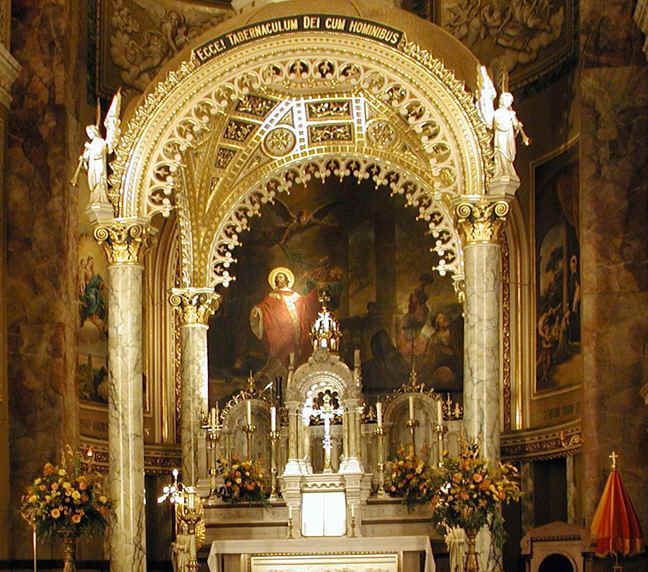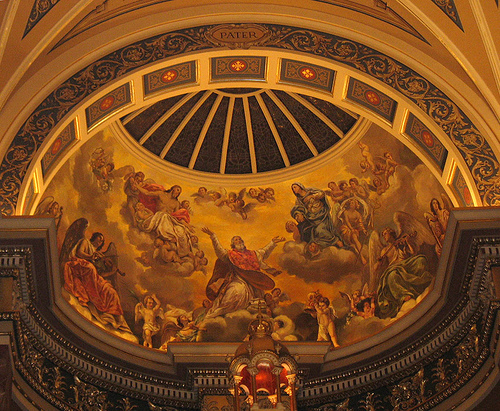

Main altar of the Basilica of St. Josaphat, Milwaukee, Wisconsin.
Josaphat Kuncewicz, contemporary with St. Francis de Sales and St. Vincent de Paul, might have been taken for a Greek monk of the 11th century or an ascetic of the Thebaid. A stranger to the intellectual culture of the West, he knew only the liturgical books and sacred texts used in his own Rite; as a priest, an Archimandrite, a reformer of his Order of St. Basil, and lastly as Archbishop, he combated all his life the consequences of the schism of Photius, and closed the struggle by culling the palm of martyrdom. Yet all this took place in the heart of Europe, in the countries then subject to Catholic Poland, during the reign of the most pious of its kings. How is this mystery to be explained?
Immediately after the Mongolian invasions, Poland received into her arms, rather than conquered, the Ruthenian nation-that is to say, the Slavs of the Greek rite from the rivers Dnieper and Dwina, who had formed around their capital and religious metropolis, Kiev, the nucleus of the power now known as Russia. Had she granted a participation in her own national life to these people separated from, but not bitter enemies of, the Roman unity, who came to her full of confidence in her strength and her justice, Poland might have secured the triumph of the Catholic cause, and her own dominion throughout Slavonia. The union of the newcomers with the Roman Pontiff, which a little more political insight and religious zeal might have brought about in the 14th century, was not concluded until 1595.
This was the Union of Brzesc. By the compact signed in this little town of Lithuania, the metropolitan of Kiev and the other Greek bishops declared that they returned to the communion of the holy Apostolic See. Being the spiritual superiors of half the nation, they thus completed the union of the three peoples, Ruthenian, Lithuanian, and Polish, then subject to Sigismund III. Now, a religious reform, even if decreed by a council, does not become a reality until men of God, true apostles and if need be martyrs, come forward to consummate it. This was the vocation of St. Josaphat, the apostle and martyr of the Union of Brzesc. What he did not himself carry out was completed by this disciples. A century of glory was secured to the nation, and its political ruin was delayed for two hundred years.
But Poland left in a state of humiliating inferiority the clergy and people of the Greco-Slavonic rite, who had taken shelter in her bosom; her politicians never admitted practically that Christians of the Greek rite could be true Catholics on an equality with their Latin brethren. Soon, however, the Latin Poles were engaged in deadly combat with the Muscovites, and we know how the former were vanquished. Historians lay down the causes of Poland's defeat; but they usually forget the principal one, which rendered it irremediable-the almost total destruction of the Union of Brzesc, the forced return to schism of the immense majority of the Ruthenians whom St. Josaphat had brought into the Catholic Church. The consummation of this abhorrent work contributed, far more than political circumstances or military triumphs, to establish Russia's victory. Poland, reduced to nine or ten million Latins, could no longer struggle against her former rival, now become her stern ruler.
St. Josaphat will always be the patron and model of future apostles for the conversion of Russia and the whole Greco-Slavonic world. By his birth, education and studies, by the bent of his piety and all his habits of life, he resembled far more the Russian monks of later times than the Latin prelates of his own time. He always desired the ancient liturgy of his Rite to be preserved entire; and even to his last breath he carried it out lovingly, without the least alteration or diminution, just as the first apostles of the Christian Faith had brought it from Constantinople to Kiev. May prejudices born of ignorance be someday obliterated; and then, despised though his name now is in Russia, St. Josaphat will no sooner be known than he will be loved and invoked by the Russians themselves.
We cannot presume to add anything more to the details provided by the liturgical lessons:
Josaphat Kuncewicz was born of noble Catholic parents at Vladimir in Volhynia. When a child, as he was listening to his mother telling him about the Passion of Christ, a dart issued from the image of Jesus Crucified and wounded him in the heart. Set on fire with the love of God, he began to devote himself with such zeal to prayer and other works of piety, that he was the admiration and the model of his older companions. At the age of twenty he became a monk under the Rule of St. Basil, and made wonderful progress in evangelical perfection. He went barefoot even in the severe winter of that country; he never ate meat, drank wine only when obliged by obedience, and wore a rough hair-shirt until his death. The flower of his chastity, which he had vowed in early youth to the Virgin Mother of God, he preserved unspotted. He soon became so renowned for virtue and learning, that in spite of his youth he was made superior of the monastery of Byten; soon afterwards he became Archimandrite of Vilna; and lastly, much against his will, but to the great joy of Catholics, he was chosen Archbishop of Polotsk.
In this dignity he relaxed nothing of his former manner of his life; and had nothing so much at heart as the divine service and the salvation of the sheep entrusted to him. He energetically defended the Catholic Faith and Unity, and labored to bring back schismatics and heretics to communion with the See of Saint Peter. He never ceased to defend the Sovereign Pontiff and the plenitude of his power, both by preaching and by writings full of piety and learning, against the shameless calumnies and errors of the wicked. He vindicated episcopal rights, and restored ecclesiastical possessions which had been seized by laymen. Incredible was the number of heretics he won back to the bosom of Holy Mother Church; and the words of the Popes bear witness how greatly he promoted the union of the Greek schismatic with the true Latin Church. His revenues were entirely expended in restoring the beauty of God's house, in building dwellings for consecrated virgins, and in other pious works. So bountiful was he to the poor, that, on one occasion, having nothing wherewith to supply the needs of a certain widow, he ordered his Omophorion, or episcopal pallium, to be pawned.
The great progress made by the Catholic Faith so stirred up the hatred of wicked men against the soldier of Christ, that they determined to put him to death. He knew what was threatening him; and foretold it when preaching to the people. As he was making his pastoral visitation at Vitebsk, the murderers broke into his house, striking and wounding all whom they found. St. Josaphat meekly went to meet them, and accosted them kindly, saying: My little children, why do you strike my servants? If you have any complaint against me, here I am. Hereupon they rushed on him, overwhelmed him with blows, pierced him with their spears, and at length despatched him with an axe and threw his body into the river. This took place on the 12th of November, 1623, in the 43rd year of his age. His body, surrounded with a miraculous light, was rescued from the waters. The martyr's blood won a blessing first of all for his murderers-for being condemned to death, they nearly all abjured their schism and repented of their crime. As the death of this great Bishop was followed by many miracles, Pope Urban VIII granted him the honors of beatification. On June 29th, 1867, when celebrating the centenary of the Princes of the Apostles, Pope Pius IX, in the Vatican Basilica, in the presence of the College of Cardinals, and of about 500 Patriarchs, Metropolitans, and Bishops of every Uniate Rite, assembled from all parts of the world, solemnly enrolled among the Saints this great defender of the Church's Unity, who was the first of the Oriental Rites to be thus honored. Pope Leo XIII extended his Mass and Office to the universal Church.

Our Lord and Our Lady receive St. Josaphat into Heaven.
Contact us: smr@salvemariaregina.info
Visit also: www.marienfried.com